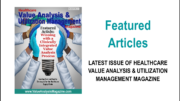Michael Bohon, CPSM, C.P.M., CMRP, Managing Director of HealthCare Solutions Bureau
In the healthcare environment there are so many opportunities for us to spend money in order to improve our organizations. There are the essentials – staffing, facilities, equipment, supplies, etc., especially those in the diagnostic and treatment areas. Also, we are and have been inundated with new technologies whose purpose is to help us do our jobs better in the supply chain and some are successful in doing just that. One of the toughest problems we face is selecting from the myriad of choices and another is trying to spend our money wisely. With many of these we perform a return on investment (ROI) study to determine whether it will be worth our while to proceed or whether the money should be spent elsewhere. This is considered to be especially important with the decisions involving purchases of high dollar sums.
Often neglected are the smaller payouts that can virtually guarantee remarkable ROIs and reductions in our operating costs. On top of that these financial benefits of such investments are repeated over and over. I am referring to investments in the continuing education of your supply chain professionals.
These valuable employees who have a direct effect on your total financial performance often operate with their hands tied because of their lack of opportunity to increase their knowledge and improve their business skills. They often have to rely on one of the following methods to learn more about their functions and how to improve them:
- Past academic study – A very good source in general but often does not provide details on how to apply the theoretical knowledge to their specific tasks and responsibilities.
- On the job training – A common method, but it sometimes becomes a process of trial and error or learning by your mistakes, which can be costly.
- Mentoring – Learning from a more experienced individual can help but depends on how learned they are and whether or not their methods kept pace with recent business advances.
 The primary reasons for paying attention to the area of education in the supply chain are:
The primary reasons for paying attention to the area of education in the supply chain are:
1. The potentially large ROI that can be achieved through:
- Purchase cost reductions
- More efficient and effective operations
- Elimination of waste of money, materials, and labor
2. The injection of new and broader knowledge into the staff by having them participate in educational programs and providing the potential for sharing what they have learned through cross-training.
3. The long-term goal of developing your staff so they can be better prepared to move up in the organizational structure as opposed to you losing them to other organizations.
There is a fourth reason. Reflect on the fact that the supply chain in a healthcare organization can and should be considered the lifeblood of the business, and its employees are the ones who ensure the smooth and effective operation of its vital functions. All too often that fact is lost or forgotten.
I recall years ago when I was working at a major hospital one of my key team members expressed her frustration about how our work was overlooked and the work we accomplished did not seem to matter to others. I told her to consider that everything she and her associates did every day in the performance of their jobs had a direct or indirect positive effect on other human beings and not everyone can say that about their work.
I also recall a management meeting I attended at a client hospital. The CEO said, “I know you people in the support departments get frustrated when we focus on the nurses so much. They get our attention, the raises and the bonuses, but you have to understand that without a nurse there is no patient.” From the back of the room people heard me say, “Without supplies and equipment, there is no treatment.”
Later I took this thought even further when I was addressing a national healthcare supply chain group. I suggested that the audience take some time to visit the ICUs in their facility and observe doctors and nurses treating patients who are struggling for their lives to recover from illnesses or accidents. The other things that were obviously key to the recovery of the patient were the supplies and equipment located in and around the room. I said, “Unless those doctors and nurses have healing powers that can raise the patient from the bed or the operating table, they need us in the supply chain and the services we provide. No nurse or physician, no matter how proficient, can perform the functions of their profession without the tools we provide them.”
 Stepping down from my soapbox I simply want to emphasize to people that the relatively small amount of money required to provide necessary educational programs not only results in the significant savings mentioned before, but also provides those being schooled a greater feeling of self worth and understanding that their organization values them and is willing to invest in them. The opportunity to improve both performance and morale should not be ignored.
Stepping down from my soapbox I simply want to emphasize to people that the relatively small amount of money required to provide necessary educational programs not only results in the significant savings mentioned before, but also provides those being schooled a greater feeling of self worth and understanding that their organization values them and is willing to invest in them. The opportunity to improve both performance and morale should not be ignored.
I have been developing supply chain educational programs and presenting them to audiences around the country for 15+ years. I still enjoy witnessing the enthusiasm people display while learning new skills and honing current ones.
A few years ago I taught a series of three classes to a group of hospitals in the mid-west on improving their negotiation skills. Imagine the satisfaction I felt when one of the participants came up to me during the second session. She excitedly announced, “Michael, I tried your suggestion on the power of silence in a negotiation recently and it really worked! Thank you for your help.”
People need, can benefit from, and appreciate the help and tools that education provides them. It’s about time we provide more of it for them.
Michael Bohon, CPSM, C.P.M., CMRP is the Managing Director of HealthCare Solutions Bureau. For more information on HSCB’s supply chain educational programs contact bohon@hcsbureau.com.





